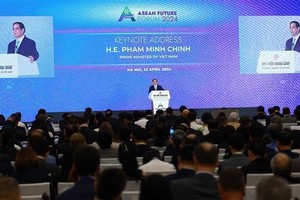Anti-government protesters threatened Tuesday to unleash another street "offensive" against the prime minister and described the Election Commission's unexpected order to disband his ruling party as just a ploy to buy time in Thailand's political crisis.
On Monday, the commission ordered the dissolution of the Democrat Party for allegedly concealing campaign donations, while the powerful army chief threw his weight behind calls for new elections.
The moves were initially expected to blunt demonstrations by thousands of "Red Shirt" protesters whose monthlong campaign exploded into brutal clashes Saturday, leaving 21 people dead and hundreds wounded in the country's worst political violence in nearly two decades.
Protest leaders accuse troops of gunning down protesters while the government says still unidentified "terrorists" were behind the killings. Reporters saw battlefield weapons in the hands of some Red Shirts.

Weng Tojirakarn, a key protest leader, told The Associated Press that the activists would stick to their demands for Prime Minister Abhisit Vejjajiva to immediately dissolve Parliament and hold elections.
"There's no other way. If Abhisit dissolves Parliament at noon today, we'll have all gone home by three in the afternoon. Just say the word and this whole protest will end," Weng said.
Another protest leader, Nattawut Saikua, declared that demonstrators would march on a military camp Wednesday where the prime minister has been living during the crisis if the army didn't "immediately stop sheltering a murderer like Abhisit."
Calling for an "offensive mobilization," Nattawut said that even if Abhisit stepped down, he would face murder charges. Earlier, the Red Shirts called for him to leave the country.
Weng said the Election Commission order to disband Abhisit's party still had to pass through the Attorney General's Office and the Constitutional Court before the country's oldest party could be ousted from power.
"Make no mistake about it: This is a long legal process. It can be a ploy for Abhisit to buy time," he said.
Despite threats of further confrontations, tensions subsided in the Thai capital Tuesday as residents and foreign tourists took to the streets to begin three days of Thai New Year celebrations. Weng said that the Red Shirts would also take part in what is an annual orgy of water throwing, dancing and heavy drinking.
In Washington, Thailand's Foreign Minister Kasit Piromya lashed out at former Prime Minister Thaksin Shinawatra — whose ouster in a 2006 coup exposed the country's deep political divisions — accusing Thaksin of personally instigating the recent deadly clashes and calling him a "bloody terrorist."
Speaking Monday on the sidelines of a global nuclear summit in Washington, Kasit compared Thaksin to dictators like Hitler, Mussolini and Stalin and to the terrorist movement al-Qaida, and faulted foreign governments for allowing him entry despite his being a fugitive from justice at home.
Thailand has seen three governments in the four years since the 2006 coup, and Kasit acknowledged that his country has "not found the right formula. We have not found the compromise."
U.S. Secretary of State Hillary Clinton urged Thailand to embrace reconciliation.
"While Thailand continues along its path to resolve its political differences, we remain confident in the strong, enduring bonds between the United States and Thailand, our oldest ally in Asia," Clinton said in a statement.
In Bangkok, Thanis Sriprathes, deputy secretary-general of the Election Commission, told reporters that Abhisit's party was found guilty of failing to disclose — as required by law — that it received 258 million baht ($8 million) from TPI Polene, a cement producer listed on the Thai stock market.
The commission was scheduled to unveil its ruling on April 20, but announced it more than a week early without explanation.
A final decision on whether the Democrat Party should be dissolved, however, rests with the Constitutional Court. No date has been set to hear the case.
Abhisit suffered another blow when army chief Gen. Anupong Paochinda told reporters that dissolving Parliament and calling new elections might resolve the country's political crisis.
The army chief was until now seen as a staunch backer of the prime minister. The apparent about-face puts Abhisit under renewed pressure given that the army is an influential force in the country's politics — and has not hesitated to stage coups during previous bouts of political instability.
"If the issue cannot be resolved through political means, then Parliament dissolution seems to be a reasonable step ... I just want peace to prevail," Anupong told reporters.
At loggerheads in the yearslong struggle for power are the rural supporters of Thaksin and the traditional ruling elite represented by Abhisit and his allies.
Abhisit's supporters include business leaders, the military brass, the judiciary and bureaucrats — supported by the urban middle class.
The root of the trouble goes back to 2006 when the coup drove Thaksin from power amid accusations of corruption. Thailand has seen three governments since then, but every administration has been dogged by street protests by rival groups.
In 2008, anti-Thaksin protesters besieged the government headquarters for months and occupied the airports for a week. The crisis was defused by a court ruling similar to Monday's that unseated the pro-Thaksin government. Subsequently, Abhisit became prime minister.
The repeated unrest has threatened to ruin the country's reputation as a stable haven for commerce, investment and tourism. The stock market closed 3.6 percent down Monday.
While the Election Commission ruling could set the stage for another change in power, it may not provide a permanent solution. There is also a chance that Abhisit's impending departure could fuel another round of counter-demonstrations by his supporters.
























